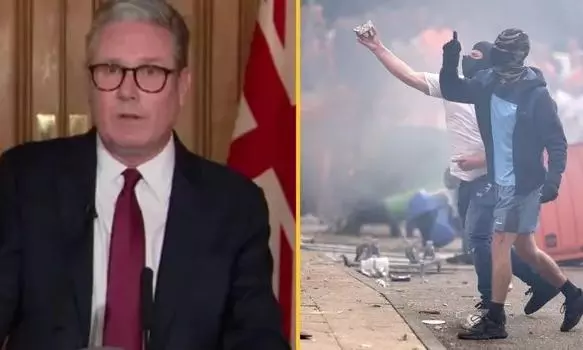
Far-Right protests: Targeting Starmer’s win with anti-immigrant rhetoric?
text_fieldsThe recent eruption of far-right protests against immigrants, particularly targeting the Muslim community in the UK, can be seen as more racial at the same time as a protest against the ascension of the relatively secular and liberal Labour Party to its power and Keir Starmer at its helm.
The stabbing of three innocent children, which triggered the latest unrest in the country, and the propagation of the killer’s identity with false credentials on social media should be seen as outcomes of the dissent against the Labour Party’s victory.
A police warning about a potential 100 far-right rallies targeting asylum centres and other locations led thousands of anti-racist activists to take to the streets across England to form human shields around these locations on Wednesday.
The police had issued cautions about the potential for violence, prompting an unprecedented national response. Local businesses, lawyers’ offices, and GP practices closed early, while MPs were advised to work from home. The security effort saw approximately 6,000 riot-trained officers deployed to manage the expected far-right protests and around 30 counter-protests, with many of the far-right groups' targets listed on the encrypted messaging app Telegram.
Despite these precautions, the day unfolded with a visible presence of counter-protesters in major cities including Liverpool, Birmingham, Bristol, Brighton, and London. In Liverpool, hundreds of people formed a human shield outside a church hosting an immigration advice centre, while in Hackney and Walthamstow, residents and anti-fascist activists gathered, holding signs with messages promoting unity and rejecting hate. In Finchley, north London, similar scenes of solidarity were observed.
Brighton saw a contrasting scene where a small group of anti-immigration protesters was outnumbered by about 500 counter-protesters. The counter-protesters, who had gathered outside a targeted law office, created a festive atmosphere with samba music and chanting. This starkly contrasted with the tense situation in Aldershot, Hampshire, where clashes occurred between groups chanting opposing slogans. Police intervened to prevent the groups from engaging directly, and there were also reports of skirmishes in Blackpool.
Despite heightened fears of violence, the day saw relatively minimal disturbances. Reports indicated that three individuals were arrested in Northampton for public order offences, and 15 people were detained across London for various crimes including assaulting emergency workers and possession of offensive weapons. Most arrests were linked to disruptive behaviour rather than organized protest.
The significant police presence and preparedness seemed to have a deterrent effect. By evening, the anticipated far-right protesters were largely absent from targeted sites, and many counter-protesters remained on the streets. This outcome was partly attributed to swift justice and substantial police action in response to previous unrest.
The scale of the police response was described as the largest since the 2011 riots. The strategy included mobilizing one-third of the riot officers available in England and Wales. Analysts and experts had expressed scepticism about the actual scale of the threats, with some suggesting that the lists of targets circulating on social media might have been exaggerated to incite panic.
In the wake of the unrest, the British legal and political institutions have been actively involved. The Director of Public Prosecutions noted that the publication of target lists might constitute a terrorist offence, and counter-terrorism detectives are investigating several incidents linked to the recent violence. This includes alleged attempts to set fire to a mosque and a hotel housing asylum seekers, which occurred shortly after the fatal stabbing of the three girls.
The security measures led to parts of England being effectively shut down, with shops boarded up in key areas such as Manchester and Birmingham. Immigration tribunals also closed early due to concerns about potential far-right activity targeting these buildings.























